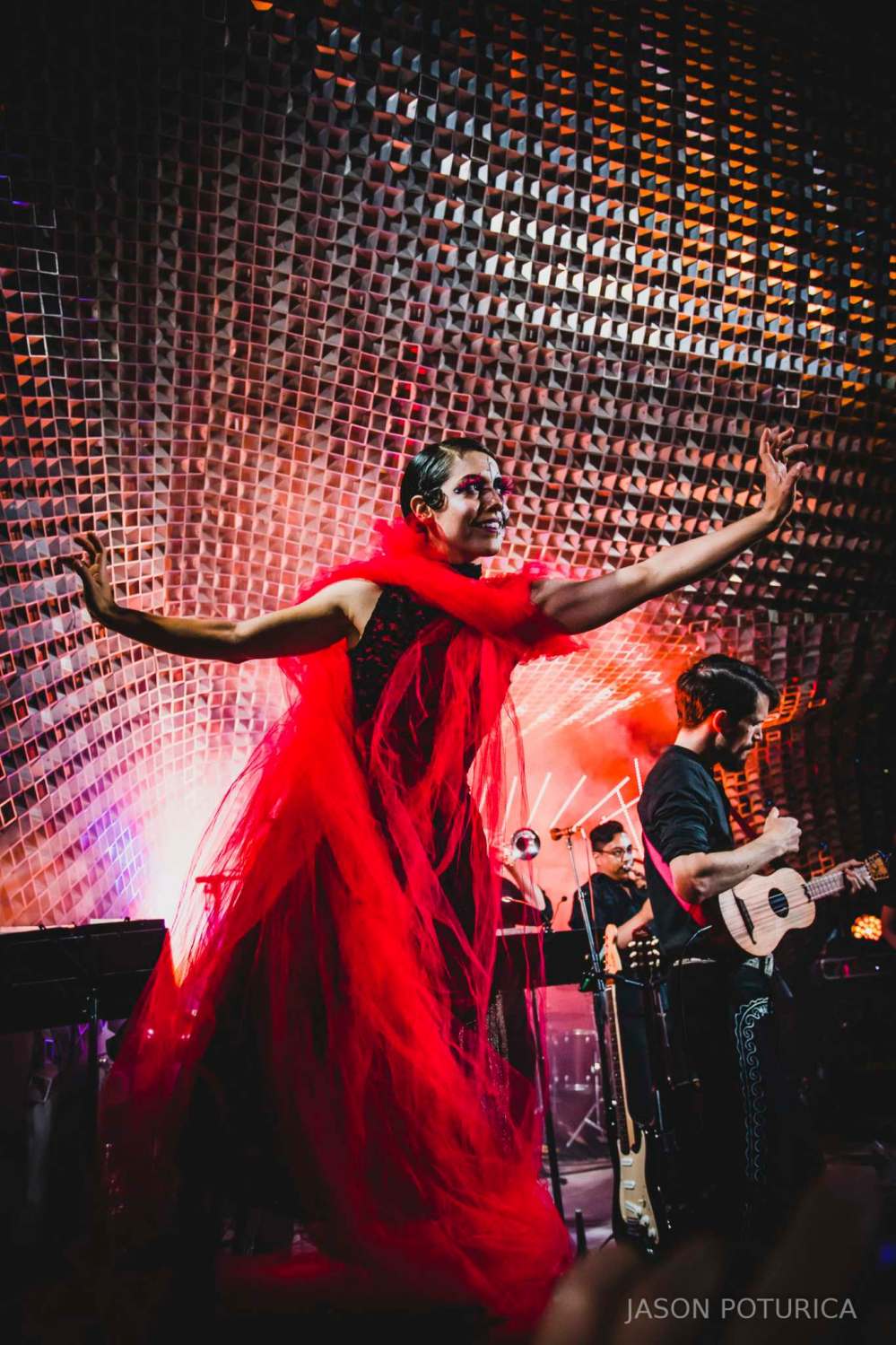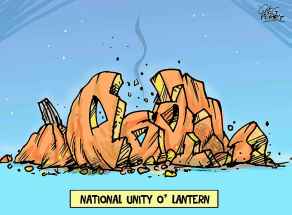Strange magic Mariachi Ghost finds inspiration in Mexican novel, family history
Read this article for free:
or
Already have an account? Log in here »
To continue reading, please subscribe:
Monthly Digital Subscription
$0 for the first 4 weeks*
- Enjoy unlimited reading on winnipegfreepress.com
- Read the E-Edition, our digital replica newspaper
- Access News Break, our award-winning app
- Play interactive puzzles
*No charge for 4 weeks then price increases to the regular rate of $19.00 plus GST every four weeks. Offer available to new and qualified returning subscribers only. Cancel any time.
Monthly Digital Subscription
$4.75/week*
- Enjoy unlimited reading on winnipegfreepress.com
- Read the E-Edition, our digital replica newspaper
- Access News Break, our award-winning app
- Play interactive puzzles
*Billed as $19 plus GST every four weeks. Cancel any time.
To continue reading, please subscribe:
Add Free Press access to your Brandon Sun subscription for only an additional
$1 for the first 4 weeks*
*Your next subscription payment will increase by $1.00 and you will be charged $16.99 plus GST for four weeks. After four weeks, your payment will increase to $23.99 plus GST every four weeks.
Read unlimited articles for free today:
or
Already have an account? Log in here »
Hey there, time traveller!
This article was published 31/10/2019 (2233 days ago), so information in it may no longer be current.
Many musicians live by the common two-year-long, write-record-release-tour album cycle. Every two years, they release a new record, tour, and then start the process over again.
By the time Winnipeg eight-piece group the Mariachi Ghost released its sophomore record, Puro Dolor, on Oct. 25, the gap between records had stretched to nearly six years, a long break by anyone’s standards.
Concert preview
The Mariachi Ghost
● Saturday, 7 p.m.
● The Planetarium
● Sold out

But there are myriad reasons for this: the bulk of the delay was rooted in the nuanced themes, stories and techniques the band wanted to implement on Puro Dolor (which translates to Pure Pain), diving deep into the complex literary concept of magical realism — a style of fiction that combines, as the name suggests, elements of modern reality with magic and supernatural activity — for their inspiration.
“I think the scope of the work was enormous and we didn’t realize that in the beginning,” says frontman Jorge Requena Ramos, 37.
“But we wanted to honour a tradition, the tradition of magical realism, from Latin America, and the more we dove into the material the more we felt it was inadequate to actually honour the tradition, and we went through a very frustrating year and a half of writing music where we would have discoveries and then failures, and we’d love something and play it in front of an audience and then we’d hate it. We wanted to do right by what we wanted to honour, we wanted to do right by our sound, and the realities of how writing music that complicated requires a lot of research and a lot of love for the material that inspired everything.
“That (magical realism) movement became so beautiful to me, to be able to touch spirituality in this world where the stories happen, and magic… that’s how music feels,” he says.
One of the source texts for the story told through the 12 tracks on Puro Dolor is Pedro Páramo, a 1955 novel written by Mexican author Juan Rulfo. It’s about a man, Juan Preciado, who travels to his deceased mother’s hometown in search of his father only to find the town to be populated by ghosts. Puro Dolor’s story varies slightly from the novel, in that also includes the discovery of a gate to hell and goes on to discuss ideas of toxic masculinity, what it means to be a strong man and how strong men are made, and even includes some comments on the Trump era from a Mexican perspective.
Pedro Páramo is often cited as a prime example of magical realism; Requena Ramos’s connection to the genre stretches back to his childhood in Mexico City, where his grandfather and mother would regale him with family stories, some true and some not.
“I grew up with these weird heroes in my life, uncles and aunts who had done interesting stuff and all these villains… my aunt was stolen, somebody kidnapped her and married her by force, things that happened in my family that were real kind of peppered through the last album a little bit,” he says.

Most of his bandmates, however, were not as familiar with magical realism and its Latin American history, so they needed to take the time to develop a band book club, each reading some of the most important works in the genre and then discussing them to get inspiration for the album’s narrative. At the same time, musically, the band plunged into the world of traditional mariachi music, learning specific writing and sonic stylings. This research went on for four years.
At the same time, Requena Ramos was approached to develop the then-unfinished album into a play, so the Mariachi Ghost travelled to Halifax in 2018 to present their music-and-theatre hybrid, Rencor Vivo, staging it in front of an audience first as a workshop and then as a play, which drastically informed the final version of the album. It made the story more real, and tactics used for stage purposes (namely the interludes) also became important elements on the album.
But perhaps the most important element is the theme of fatherhood, both intentionally within the context of the story and unexpectedly in many band members’ personal lives.
During the album-creation process, Requena Ramos’s father died; producer Jesse Zubot’s father died; keys player Tim Friesen’s father died; drummer Ian Mikita’s father died; and lead guitarist Rafael Reyes’s father faced some major health issues.
Given the content of Puro Dolor (there’s literally a song titled Padre), emotions were understandably high, but rather than stifling the grief, the band harnessed it during their last few recording sessions, giving the pain that ripples through the album some authentic origins.
“All of these things happened during the making of this, so there’s this tangible sorrow that started happening within the music… the second delivery of the play was, I was literally in tears through the entire delivery of the play because my father had just died and the connections between the play and fatherhood are so tangible, so we wanted to make sure even though it was the last little bit of recording we had that those vocals were going to carry over and intention was very top of mind when I was delivering all that,” says Requena Ramos.

“I had my zoom recorder at my dad’s funeral, because I hadn’t lived with my dad for the last 15 years, so I didn’t have stories from him for 15 years, so I brought it so other people could give me their stories so I could have them. It’s still really hard to listen to them but I managed to find a couple of moments where it felt like it was the story of the play, so I gave them to Jesse and they ended up making it into the track. So there’s recordings from my dad’s funeral, there’s ambient noises from the night outside after, the crickets, cars driving around, my aunt and uncles talking about my dad.
“The last track on the album kind of became prophetic; I wrote it not thinking about my father but thinking about a moment in Pedro Páramo where Susana has gone insane and this is the love of (Juan’s) life and he’s watching her fade away, slowly die of sorrow. So I wrote a track called You Still Hurt, that talks about the pieces of people you keep as a memory that become a part of you and then you lose them and there’s a hole in their shape left. And that became sort of the ethos of the album; I go back to that track a lot because it describes how I feel about my dad even though I wrote it before he died,” he says.
The Mariachi Ghost are marking the album release with a one-of-a-kind, sold-out show at the Planetarium on Saturday (which also, not by coincidence, happens to be the Day of the Dead) during which they will use the Planetarium’s canopy to project their own images, telling the story of the album in a new way.
They will also debut the fruits of another collaboration, with jean company Levi’s, which has designed the band a collection of embellished denim mariachi suits — a kind of Mexican-Canadian tuxedo, if you will.
There can still be some fun, even when performing a collection of songs rooted in sorrow.
“The point of the record is that you can exorcise sorrow through art, and then that part of yourself is exorcised and you’ve lived it and you don’t have to live with it all the time. One of the outlets sad music gives you… scientific research demonstrates that people who listen to sad music live happier lives because they get to experience sadness through art and they don’t have to experience it through their regular day,” says Requena Ramos.

“So hopefully it’ll help you cut down on that experience. It’s supposed to feel like a funeral, but at the end of it, there’s a catharsis that literally happened to the band so hopefully it’s a cathartic piece that allows you to release something that you’re carrying.”
erin.lebar@freepress.mb.ca
Twitter: @NireRabel
wfpyoutube:https://www.youtube.com/watch?v=cPfKUjlFYdo&feature=youtu.be:wfpyoutube
Our newsroom depends on a growing audience of readers to power our journalism. If you are not a paid reader, please consider becoming a subscriber.
Our newsroom depends on its audience of readers to power our journalism. Thank you for your support.











